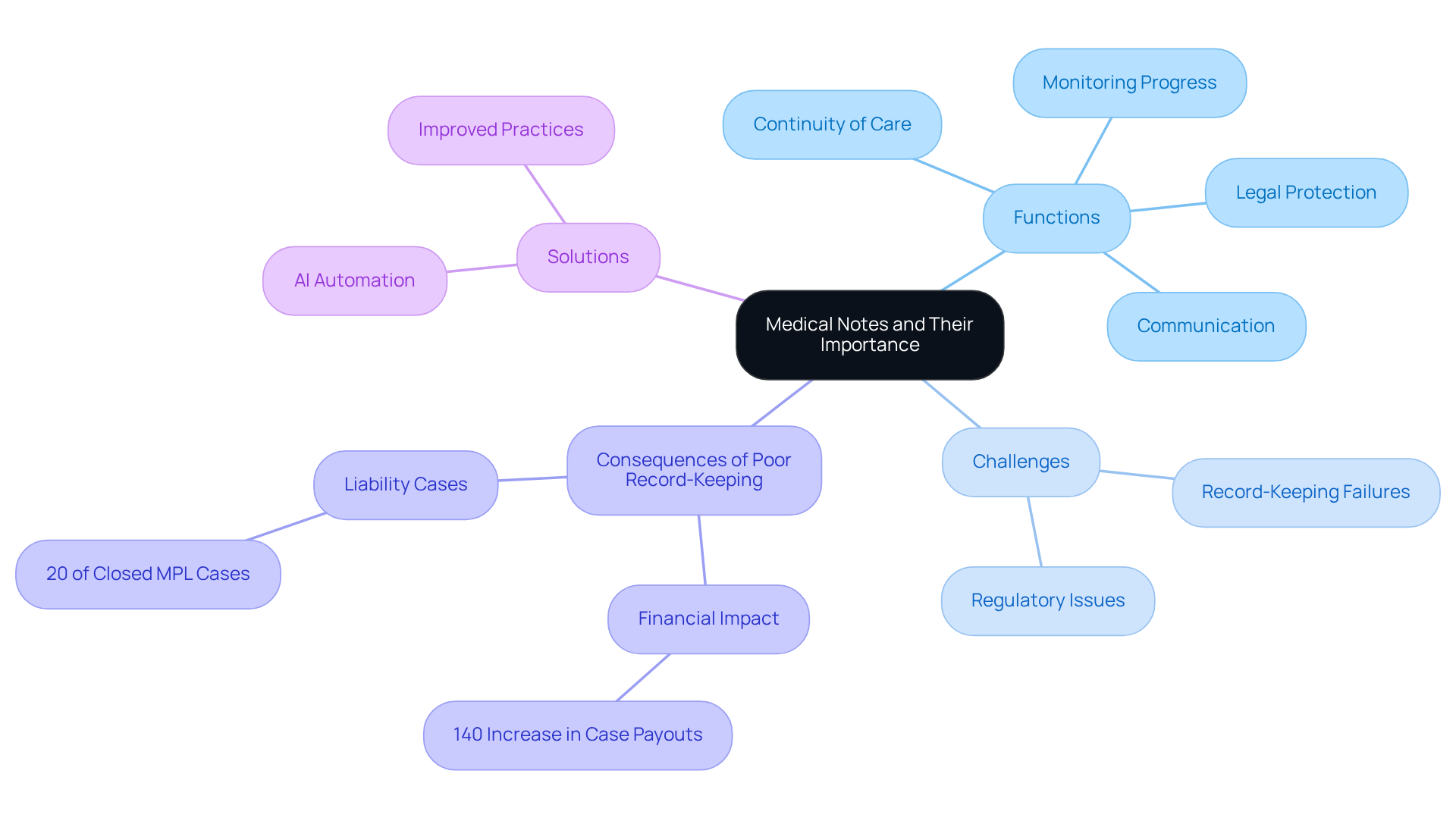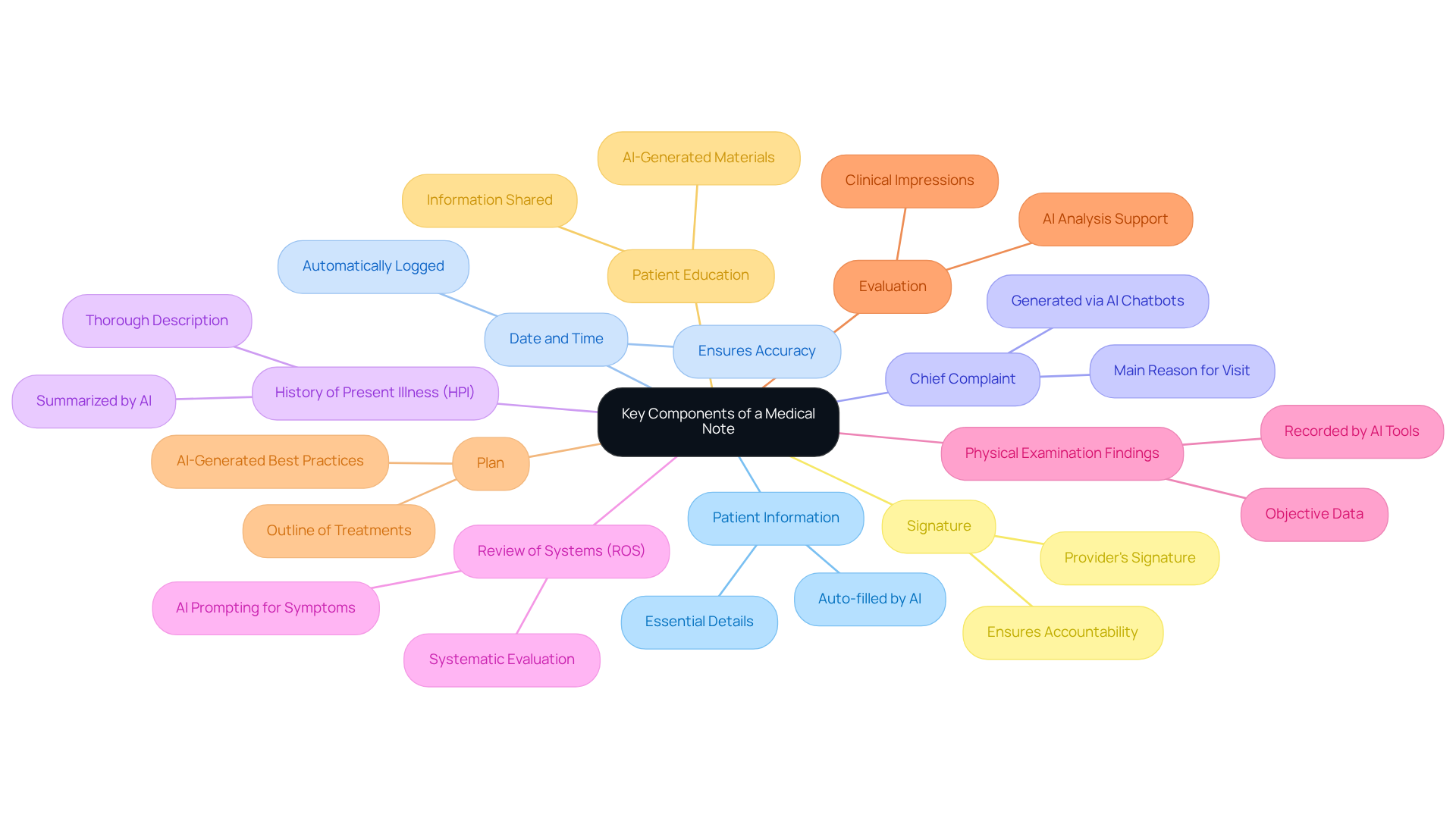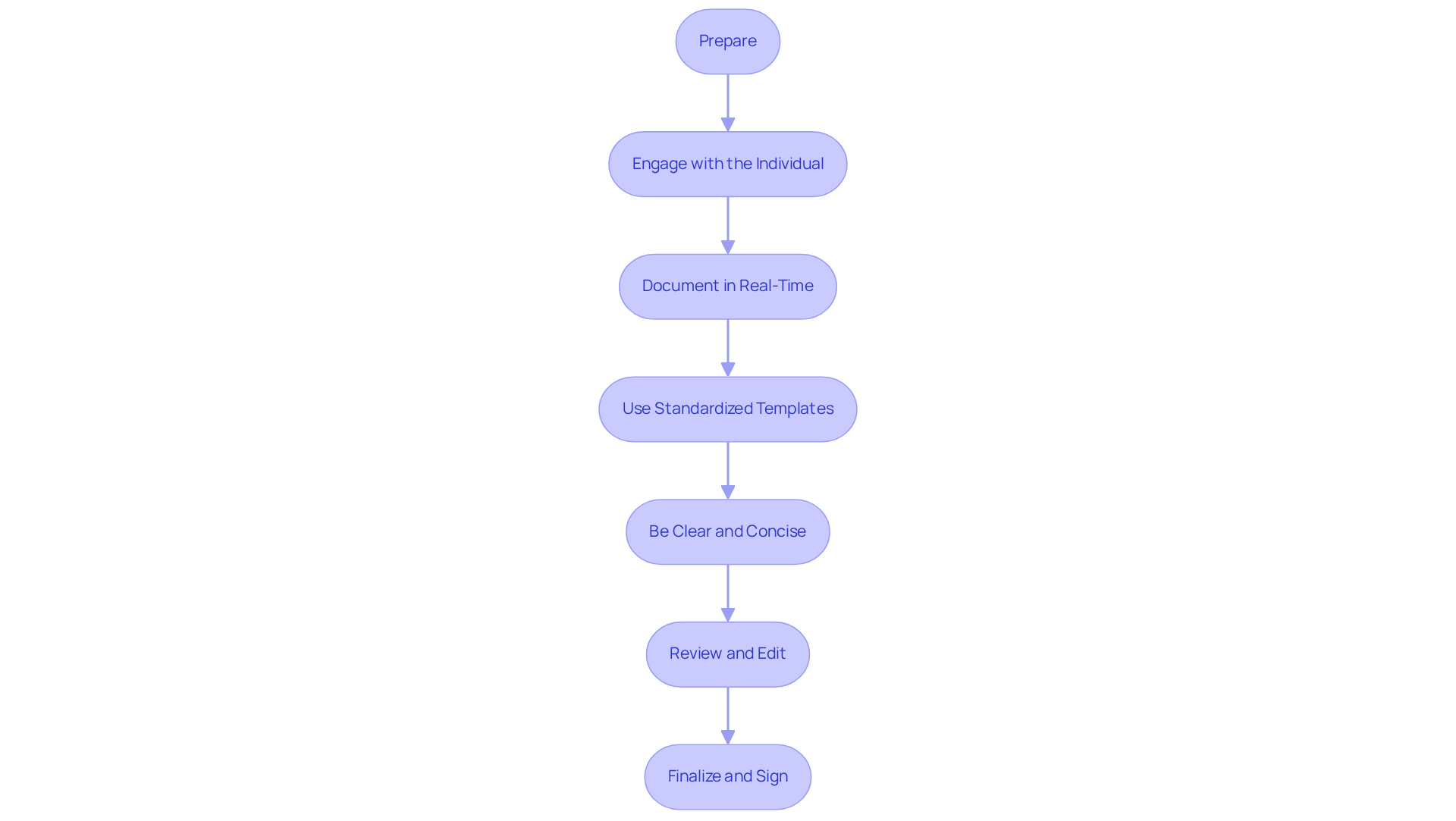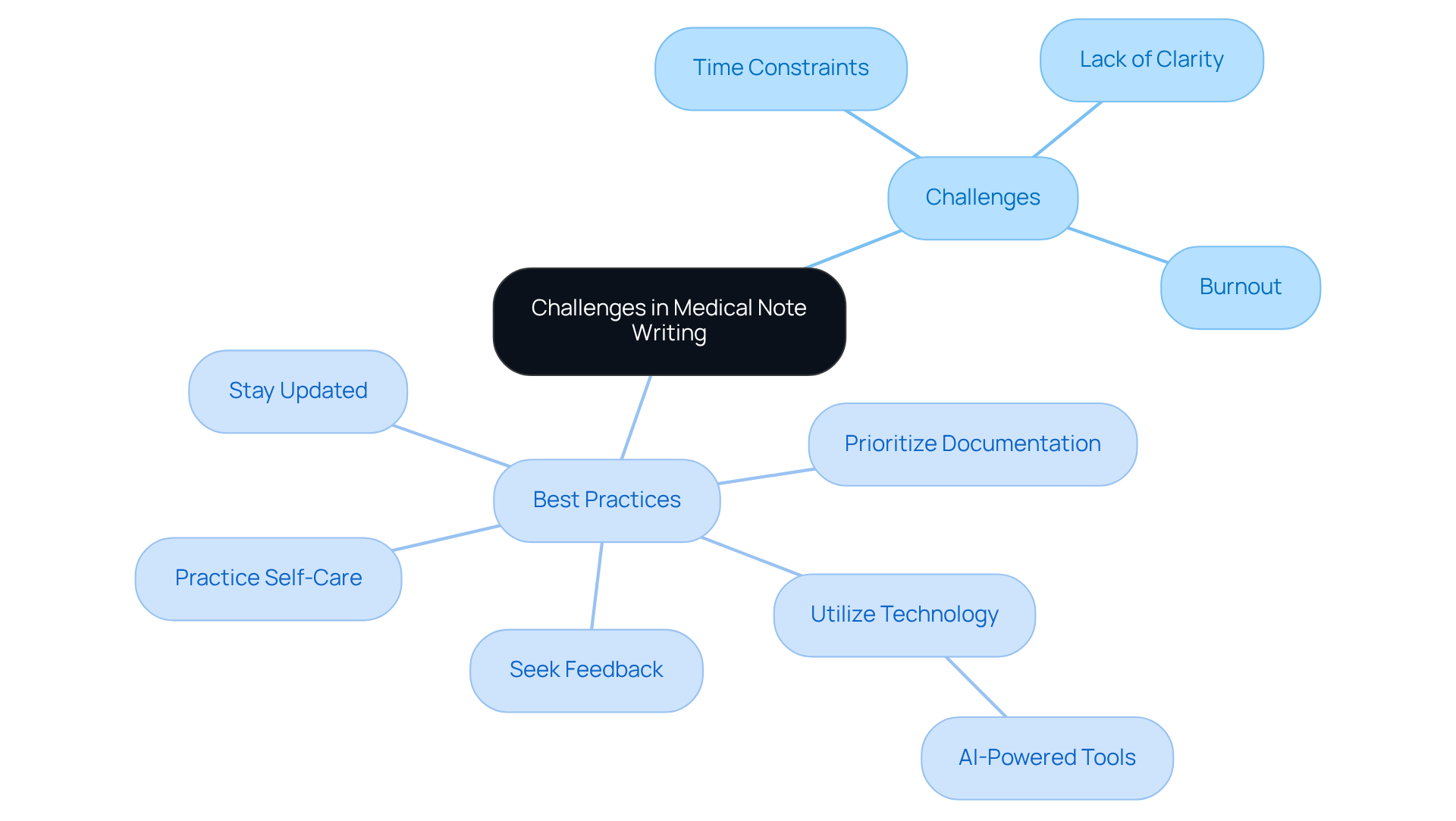Overview
Healthcare providers often face emotional challenges that can impact their ability to deliver the best patient care. Mastering medical note writing is essential in addressing these concerns. This skill not only ensures continuity of care but also provides legal protection and fosters effective communication.
Precise documentation is crucial. It relieves some of the administrative burdens that can detract from patient interactions. By adopting best practices, including the use of AI tools, providers can streamline their processes, ultimately enhancing both patient care and their own efficiency.
Consider the benefits:
- Improved documentation accuracy
- Reduced administrative workload
- Enhanced patient-provider communication
These solutions can significantly alleviate stress and foster a more compassionate healthcare environment. We encourage you to explore these strategies further, as they can lead to a more fulfilling practice and better patient outcomes.
Introduction
In the intricate landscape of healthcare, the significance of precise medical notes is profound. These vital records not only ensure continuity of care but also protect both providers and patients, fostering clear communication in a fragmented system. Yet, the growing complexity of medical documentation, alongside regulatory challenges, raises urgent questions about the effectiveness of current practices.
How can healthcare providers overcome these hurdles to enhance patient care and ensure compliance? By exploring the essential steps for mastering medical notes, we can pave the way for improved outcomes and a more compassionate healthcare environment.
Define Medical Notes and Their Importance
A medical note is a vital written record that documents individual interactions, clinical findings, treatment plans, and other relevant details during medical visits. These notes serve essential functions: ensuring , offering , and facilitating . In a fragmented medical system, where care is often split among various providers, precise medical records become even more crucial. They allow healthcare professionals to monitor client progress, make informed clinical decisions, and adhere to legal and ethical standards, thereby enhancing communication and coordination for improved care.
However, regulatory issues, like HIPAA, establish substantial communication obstacles between patients and their providers, complicating the need for accurate records. Have you ever felt the weight of these challenges? are essential for . Research shows that record-keeping issues can result in a 140% rise in the likelihood of case payouts. This highlights the financial consequences of precise records, which are vital for the sustainability of medical practices.
In fact, nearly 20% of resolved medical professional liability cases over the past decade have been linked to . This emphasizes the necessity for , particularly in the context of preparing a medical note. By prioritizing precise record-keeping, medical providers can boost safety for individuals, , and cultivate a culture of responsibility within their organizations. Imagine a world where healthcare providers can focus more on their patients rather than administrative tasks.
Utilizing can further lighten the load of record-keeping, enabling providers to concentrate more on direct interactions and care for individuals. This shift ultimately results in a more effective and compassionate medical environment. Let's work together to create a system that not only meets the demands of healthcare but also nurtures the relationships that are at the heart of it.

Identify Key Components of a Medical Note
In today's healthcare environment, a well-organized is not just beneficial; it is essential for providing and thorough documentation. This necessity becomes even more pronounced with the growing integration of . But have you ever considered how administrative burdens can impact the quality of patient care?
These medical records typically include several :
- Patient Information: Essential details like name, date of birth, and identification number, which can be conveniently auto-filled using AI from existing records.
- Date and Time: The specific date and time of the encounter, automatically logged by the system, ensuring accuracy.
- Chief Complaint: The main reason for the visit, clearly articulated, and potentially generated through individual input via AI chatbots.
- History of Present Illness (HPI): A thorough description of the current condition, outlining onset, duration, and severity, which can be summarized by AI from responses.
- Review of Systems (ROS): A systematic evaluation of other body systems to uncover any additional health issues, facilitated by AI prompting for relevant symptoms.
- Physical Examination Findings: Objective data collected during the examination, providing a factual basis for assessment, recorded and organized by AI tools.
- Evaluation: Clinical impressions and differential diagnoses that inform treatment choices, supported by AI analysis of individual data.
- Plan: A clear outline of proposed treatments, follow-up actions, and necessary referrals, generated based on best practices identified by AI.
- : Information shared with the patient regarding their condition and treatment options, fostering informed decision-making, potentially enhanced by AI-generated educational materials.
- Signature: The medical provider's signature and credentials, ensuring accountability and authenticity.
These components not only promote but also guarantee adherence to legal and ethical standards in . By incorporating AI, the process of producing these records can be simplified, allowing medical professionals to focus more on meaningful interactions with individuals rather than getting bogged down by .
A medical note, along with accurate and thorough medical documentation, is crucial for managing health insurance claims and serves as vital records in legal scenarios. This highlights their significance in the healthcare field. According to the U.S. Department of Health and Human Services, a medical note must be maintained in compliance with HIPAA regulations, which ensures individual privacy and data security. As Dr. Salwa Zeineddine emphasizes, "Effective documentation is a cornerstone of quality care for individuals," underscoring the critical role that organized medical records play in both clinical practice and legal protection.
Let’s work together to ensure that our documentation reflects the compassionate care we strive to provide.

Follow a Step-by-Step Process for Writing Medical Notes
To write effective s, embracing a is essential. Here are some vital steps to consider:
- Prepare: Before your encounter, take a moment to review previous notes and relevant medical history. This preparation fosters a comprehensive understanding of the individual’s background. Consider utilizing to analyze historical data, offering insights that can enhance your grasp of the individual’s condition.
- Engage with the Individual: During the visit, actively listen to the individual’s concerns. Ask clarifying questions to gather complete information. can assist in crafting questions that address common health issues, ensuring a more thorough dialogue that resonates with your patient’s needs.
- Document in Real-Time: As you collect information, immediately jot down a medical note with key points. This practice is crucial in preventing the oversight of essential details, which is vital for the and the completeness of the medical note. AI tools can help automate this process by recommending pertinent materials based on the discussion, allowing you to focus more on your interaction with the client.
- Use : Implement standardized templates or electronic health record (EHR) systems to ensure all necessary components are included and formatted correctly. AI can enhance these templates by tailoring them to specific patient needs or conditions, streamlining the documentation process.
- Be Clear and Concise: Strive to use straightforward language and avoid jargon, ensuring clarity for anyone reading the remarks. AI can assist in clarifying complex medical terminology, making information more accessible and understandable.
- Review and Edit: After the encounter, take the time to examine your medical note for accuracy and completeness. This step is vital, as inadequate record-keeping can negatively impact patient outcomes and lead to medication errors, underscoring the need for a thorough medical note. AI algorithms can help identify possible mistakes or gaps in your records, ensuring you maintain high-quality documentation.
- Finalize and Sign: Ensure that the medical note is signed and dated, confirming its authenticity and compliance with legal standards. By integrating AI into this process, you can enhance the security and efficiency of finalizing documentation.
By following these best practices, medical providers can significantly offered to patients while ensuring compliance with . Remember, your efforts in maintaining thorough and empathetic documentation make a meaningful difference in the lives of those you serve.

Address Challenges and Best Practices in Medical Note Writing
Challenges in medical documentation can deeply affect healthcare providers, often stemming from time constraints, lack of clarity, and the pervasive threat of burnout. These issues not only add stress but can also lead to resistance against innovative practices that could enhance . To navigate these , consider implementing the following :
- Prioritize Documentation: Designate specific time slots for note writing. This simple step can prevent the rush that often leads to errors and omissions, allowing for more thoughtful entries.
- Utilize Technology: Embrace , such as those offered by . These tools automate , enhancing efficiency and allowing healthcare providers to focus more on patient care rather than . This addresses the pressing challenges of healthcare delivery.
- Seek Feedback: Regularly review your records with colleagues. This practice not only helps identify areas for enhancement but also fosters a culture of ongoing learning and collaboration.
- Stay Updated: Keep informed about changing record-keeping standards and regulations. This knowledge ensures compliance and enhances the quality of your notes, ultimately benefiting patient care.
- Practice Self-Care: Combat burnout by maintaining a balanced workload and seeking support when necessary. This approach encourages and results in more precise and efficient record-keeping.
By adopting these strategies, healthcare providers can significantly improve their documentation practices. Ultimately, this enhancement leads to and alleviates the administrative burden, fostering a healthier work environment.

Conclusion
A comprehensive understanding of medical notes reveals their critical role in enhancing patient care and ensuring effective communication among healthcare providers. These notes are not merely administrative tasks; they are foundational to maintaining continuity of care, adhering to legal standards, and safeguarding both patient and provider interests. By prioritizing meticulous documentation, healthcare professionals can foster a more efficient and compassionate environment that ultimately benefits all parties involved.
Consider the emotional challenges you face daily. The administrative burdens can feel overwhelming, impacting your ability to provide the best care. The article outlines essential components of effective medical notes, emphasizing the significance of clarity, completeness, and compliance with regulations like HIPAA. It also highlights the transformative potential of AI and technology in streamlining documentation processes, allowing you to focus more on patient interactions rather than administrative tasks. Best practices, such as real-time documentation and standardized templates, are crucial in overcoming common challenges faced in medical note-taking.
Reflecting on the importance of medical notes, it is clear that investing time and effort into improving documentation practices is not just beneficial—it's essential for delivering high-quality healthcare. By embracing innovative tools and strategies, you can significantly enhance your documentation efforts, ultimately leading to improved patient outcomes and a more rewarding professional experience. The call to action is clear: prioritize accurate and compassionate medical note-taking to ensure the best possible care for individuals.




